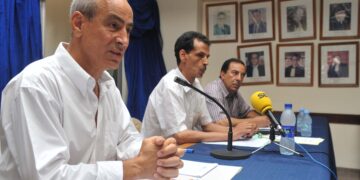Summary
After months of planning and preparation, the National Dialogue Board of Trustees previously signaled that the substantive sessions of the National Dialogue would begin in October, but as of this writing, no date has been set. In early September, the Board named 44 rapporteurs and assistant rapporteurs to guide the dialogue after finalizing the subcommittees under the dialogue's three tracks: political, social, and economic, asserting that the dialogue will be "inclusive and free." Opposition figures continue to push for the release of more political prisoners before the substantive sessions begin. Although the government has released nearly 256 political prisoners held in extended pretrial detention since September 9, it has also renewed the pretrial detention of at least 4,000 political prisoners and summoned over 1,000 people to face charges related to political dissent.
As the dialogue moves forward, political figures press for increased political prisoner releases, while also demanding an end to all pretrial detentions of non-violent suspects, as both measures are necessary for the meaningful political change that Egyptian President Abdel Fattah El-Sisi has promised this dialogue will achieve. If the government wants to persuade Egyptians that this process is not merely a cosmetic effort to enhance its image, it needs to dramatically increase political prisoner releases and promptly commence the substantive dialogue and announce all its participants.
Recommendations
- The National Dialogue Board of Trustees should show more transparency regarding the dialogue process and provide clear guidelines on how it will conduct the dialogue, who it will invite to participate in the numerous subcommittee sessions, and how it will ensure public broadcast of the substantive sessions.
- The Board should also ensure that journalists can access and report on these sessions and regularly report on its progress to the Egyptian people.
- With the substantive sessions of the National Dialogue set to begin late this year, political figures and civil society leaders should continue to press the Egyptian government to release more political prisoners and make reforming the pretrial detention law a priority during the National Dialogue.
- Western government leaders and international donors should also press the Egyptian government to release more political prisoners, particularly as Egypt requires significant financial assistance to deal with its ongoing economic crisis, providing international actors with leverage to push for reforms.
Background
On April 26, President Abdel Fattah El-Sisi surprised both his political supporters and his opponents when he announced that the Egyptian government would hold a National Dialogue to allow for national reconciliation. Presented during the Egyptian Family Iftar, near the end of Ramadan, Sisi promised to allow broad participation representative of "all of the country's political forces, without exception or discrimination." As envisioned, the completion of the National Dialogue will result in legislative proposals that Sisi and his advisors will review and assess, and implement those it feels will help resolve the country's political, social, and economic crises.
The planning of the National Dialogue began slowly, but quickened after the National Dialogue Administration appointed the National Dialogue Board of Trustees on June 26. Tasked to organize and complete the dialogue, the nineteen-member board began meeting in July and August to design the dialogue processes, including its structure and organization. Through a series of meetings, the Board established three main tracks: political, social, and economic, as well as 15 subcommittees. On August 3, the Board met to create the economic track, and then paused its activities until its next scheduled meeting on August 27. It postponed the August 27 meeting until September 5, as several members were traveling or sick.
Before the September 5 meeting, the Board announced that the National Dialogue would soon transition from its planning stage to substantive sessions. Meeting on September 5, the Board named general rapporteurs and assistant rapporteurs for the three main tracks, including Ali Eddin Hilal as general rapporteur for the political track. It also named Hossam Badrawi as consultant to the dialogue to present Egypt's 2030 Vision
The Board met again on September 10, where it named 44 rapporteurs and assistant rapporteurs for the rest of the subcommittees. Importantly, one of those named is a former political prisoner, Khaled Dawoud, who was named assistant rapporteur of the Political Parties subcommittee.
It also added two more subcommittees by expanding the subcommittees in the political track. Instead of three subcommittees, the political track will now feature five. The Board also added a tourism subcommittee to the economic track, bringing that subcommittee total to eight, and a youth subcommittee to the social track, bringing that total to six. In total, the Board named 44 rapporteurs and assistant rapporteurs at the two September meetings.
Human rights lawyer and National Dialogue Board Member Negad El-Borai noted that the Board considered 550 nominees before deciding on the final 44 rapporteurs and assistant rapporteurs. El-Borai also said that the selections reflect a wide diversity of thought and political opinion, arguing that the National Dialogue is more than a simple debate between the government and the opposition: "[I]t is a dialogue among different political forces, loyalist, and opposition, and will also include social and economic experts. The expectation is that together they will reach a consensus on national priorities for the next decade."
The Board attempted to divide the rapporteurs evenly between individuals affiliated with a political party and political independents. It arrived at a selection of 23 independents and 21 party-affiliated individuals. Mostaqbal Watan (Future of the Nation) had the most rapporteur appointments, with seven. Other political parties with members selected as rapporteurs or assistant rapporteurs include Tagammu, Wafd, Reform and Development, Al Adl (Justice), Al Dostour (Constitution), Egyptian Liberals, and Free Socialists, among others.
National Dialogue General Coordinator Diaa Rashwan has consistently stated that the National Dialogue must produce concrete legislative or executive proposals to present to Sisi and should conclude its work within six months of its start, while reporting on its progress throughout the process. On October 10, the Board announced that October 15 is the deadline for submitting names of possible participants in the dialogue. Accordingly, with the substantive sessions seemingly only weeks away, Egyptians will soon begin to see whether Rashwan can steer the process to accomplish these goals or whether the National Dialogue will amount to little more than empty political theater or a mirage rather than real change, as many commentators have predicted.
Participation in the National Dialogue and the Civil Democratic Movement's Response
Participation in the National Dialogue itself became a contested issue among civil and political activists in the country, with some criticizing those who chose to participate, arguing that they served to legitimize the government's cosmetic efforts to portray itself as willing to reform. DAWN urged opposition leaders inside and outside of Egypt to maintain solidarity and to avoid allowing their differing approaches and rationales for participation in or boycott of the National Dialogue to divide them and serve as a distraction from the Egyptian government's inability to address the human rights, governance, and economic crises that it has created. It also recommended all sides to allow the process to unfold and respect the arguments of one another to obtain whatever political and human rights gains are possible in this narrow window.
Whether many Egyptians view the National Dialogue as credible will depend in significant part on the extent to which the government's political opposition, such as it is allowed, engages in the process. Few political figures have rejected the process outright, but many individuals and parties have maintained that their participation should be premised on the government undertaking measures to show that it is serious about reform and will allow for open and honest debate. For many, this includes the release of political prisoners, whether arbitrarily detained through pretrial detention or unjustly convicted for the peaceful exercise or political expression.
This includes the Civil Democratic Movement (CDM), a coalition of liberal political parties and public figures that make up Egypt's largest opposition group. Earlier this year, the CDM submitted a list of 1,074 political prisoners for presidential pardon or release, but to date, Egyptian authorities have released less than half of these individuals. Still, despite some internal differences, the CDM welcomed the National Dialogue, with one member calling the process "a window of opportunity to express our concerns and get our voices heard." Now, with the substantive sessions seemingly only weeks away, the CDM has reiterated its calls for more political prisoner releases and a further opening of political space.
After the September 5 National Dialogue Board meeting, the CDM met and issued a statement on September 7 that outlined five key points regarding the dialogue. The first point focused on the slow pace of political prisoner releases and accused the government of "adopting a policy of sluggishness in the preparation of those released at different intervals." The second point criticized continued arrests of Egyptians for expressing their political opinions and the government's persistent attacks on the media. The statement also condemned the government's adoption of economic and political measures before the dialogue began, confirmed that its participation in the dialogue's preparatory meetings did not equate to approval for the government or its recent policies, and suggested creating additional subcommittees under the political track by dividing the subcommittee on political rights, parties, and parliamentary representation into three separate subcommittees.
Rashwan agreed to consider the last point, and the Board accepted this proposal at its September 10 meeting. Nonetheless, pro-government figures attacked the CDM for its statement, including making unfounded claims that the group supported terrorism. The CDM's request to create additional subcommittees came in part due to its objection of the Board's appointment of Hilal as rapporteur of the political track, given Hilal's close relationship with former President Hosni Mubarak and his support of Sisi. The CDM also criticized the selection of rapporteurs and assistant rapporteurs as not evenly divided, more pro-regime than opposition, and as misleadingly describing some pro-government figures as members of the opposition.
Alongside the government-led National Dialogue process, three prominent opposition leaders outside the country, Ayman Noor, Mamdouh Hamza and Mahmoud Wahba, called for a parallel "National Dialogue in Exile". Many exiled opposition figures participated in this dialogue and published a book detailing their recommendations on reforms in the country's politics, economy and social issues.
No Official Start Date Amid Slow Political Prisoner Releases and Media Attacks
Although the Board has not yet announced an official start date for the substantive sessions, board members have publicly stated that they expect these sessions to begin "soon" without announcing an official start date.A source at the Board of Trustees said that "I don't think the National Dialogue first sessions will start before the COP27." The failure of the government to set a start date, while taking advantage of the positive international publicity of a process for dialogue, is indicative to many that the dialogue is not a serious reform exercise.
The Board clarified that the National Training Academy will host the substantive sessions, and said that it would provide special attention to political parties, trade unions, and civil society, as these groups have faced heavy-handed government repression. It also insists that the National Dialogue process will be "inclusive and free."
Questions remain as to how the Board will conduct the dialogue, who it will invite to participate in the numerous subcommittee sessions, and how it will ensure public broadcast of the substantive sessions, as promised earlier this year. Serious concerns also remain over how it will regulate journalists covering the National Dialogue, especially after recent media attacks on Mada Masr, and how the Board will report the dialogue's progress to the Egyptian people.
Faced with continued criticism for the extremely slow pace of political prisoner releases, Egyptian authorities released 33 political prisoners on September 9, 46 political prisoners on September 15, and 50 more prisoners on October 2. On October 12, Egypt's Presidential Pardon Committee announced a plan to release 70 detainees, and on October 17, it announced that the authorities had released 25 pretrial detainees.
It was not enough for the Egyptian authorities to slow down the process of releasing political prisoners, but that they rearrested the activist Sherif El Rouby after 3 months of being released in Presidential pardon. political figures and human rights defenders take that as a clear sign that the government is not serious in releasing political detainees.
Since Sisi announced the National Dialogue on April 26, the government has renewed the detention of at least 4,000 political prisoners through pretrial detention. Similarly, between April 23 and September 12, Amnesty International reported that Egyptian authorities summoned 1,019 individuals to the Public Prosecutor in Cairo on charges related to political expression. During this period the government ordered the release of 336 political prisoners, but it is unclear how many it released.
While opposition leaders such as Medhat al-Zahid, head of the Popular Alliance Party, welcomed these releases, they also noted that numerous political prisoners remain in prison, including human rights activists Ahmed Douma, Alaa Abd El-Fattah, and Mohamed El-Baqer; former presidential candidate Abdel Moneim Aboul Fotouh; former head of the Muslim Brotherhood's Freedom and Development Party, Khairat Al-Shater, and then 19-year old student Anas El-Beltagy. On September 12, El-Fattah said that he may die in prison due to his deteriorating health in the midst of a hunger strike now nearing seven months. Although El-Fattah became a British citizen nearly a year ago, Egyptian authorities have not yet allowed British officials to meet with him, a stark violation of El-Fattah's consular rights.
Human rights attorney and labor activist Haitham Mohammadein was one of the 46 political prisoners freed on September 15. Egyptian authorities had detained Mohammadein since May 2019 on baseless charges, including participating in a terrorist organization to achieve its goal, spreading false news and statements, and misusing social media platforms, but never tried him before a court. Before his release, Mohammadein's lawyer had requested access to a specialized physician due to Mohammadein's declining health.
Hamdeen Sabahi, a founder of the Karama (Dignity) Party and former presidential candidate, congratulated the detainees on their release. Like many civil society leaders, Sabahi had called for the release of political prisoners before the start of the National Dialogue, and argued the continued detainment of political prisoners serves no one's best interest. Sabahi also argued that the National Dialogue will be a test not just for the government and its supporters, but for the opposition, as opposition figures and political parties will need to propose solutions and workable policies to address Egypt's crises, and not just describe the problems.
Just before the political prisoner releases on September 9, Egyptian authorities continued their attack on the media by arresting Mada Masr editor-in-chief Lina Attalah and three Mada Masr staff writers: Rana Mamdouh, Sara Seif Eddin, and Beesan Kassab. Prosecutors questioned the journalists over charges of slander, defamation, and "spreading false news intended to disturb the public peace" regarding an August 31 story detailing corruption by members of the National Future Party, a political party closely tied to Sisi and which has the largest number of National Dialogue rapporteurs and assistant rapporteurs. Prosecutors also charged Attalah with "operating an unlicensed website," even though she has tried to register the Mada Masr website repeatedly since 2018.
This attack on one of the very last independent news outlets in Egypt led many to conclude that the government is not serious about the National Dialogue or political reform. While difficult to conclude with complete accuracy, Egyptian authorities have imprisoned at least 733 journalists and media workers between 2013 and 2020. Since Sisi came to power through a military coup in 2013, Egyptian authorities have systematically targeted, harassed, arrested, and imprisoned journalists and media workers, making Egypt one of the worst places for journalists in the world. Reporters Without Borders ranks Egypt 168 out of 180 countries in its annual index and describes the country as "one of the world's biggest prisons for journalists."
Conclusion
Opposition leaders should continue to press the Egyptian government to release more political prisoners and to make meaningful reforms to open political space in Egypt. Foremost among these reforms is the need to amend the pretrial detention law and to stop "recycling" or "rotating" cases when detainees reach their two-year legal limit and the government cannot present a case to justify continued detention. While few expect the National Dialogue to produce significant change or political breakthroughs, by continuing to engage seriously in the process, the opposition can force the government to justify its repressive political practices and disastrous economic policies. This alone could lead to greater political space and better governance. In this sense, the most important contribution of the National Dialogue may not be any specific outcome, but the larger recognition that Sisi's government has so little to show for its near decade of authoritarian rule. until now, the Board of Trustees of National Dialogue hasn't announced a fixed date of starting the dialogue, and the names of the participants are unknown, besides the agenda hasn't been finished yet. All these facts make politicians inside and outside Egypt become sure that it is only a long term play acted by the government just to tell the international community that they are on the way to political reform.




































